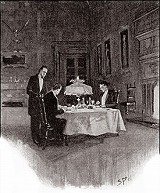I saw his dark face lit up with a boyish enthusiasm as he gazed about him. The light beat upon him where he stood, but long shadows trailed down the walls and hung like a black canopy above him. Barrymore had returned from taking our luggage to our rooms. He stood in front of us now with the subdued manner of a well-trained servant. He was a remarkable-looking man, tall, handsome, with a square black beard and pale, distinguished features.
“Would you wish dinner to be served at once, sir?”
“Is it ready?”
“In a very few minutes, sir. You will find hot water in your rooms. My wife and I will be happy, Sir Henry, to stay with you until you have made your fresh arrangements, but you will understand that under the new conditions this house will require a considerable staff.”
“What new conditions?”
“I only meant, sir, that Sir Charles led a very retired life, and we were able to look after his wants. You would, naturally, wish to have more company, and so you will need changes in your household.”
“Do you mean that your wife and you wish to leave?”
“Only when it is quite convenient to you, sir.”
“But your family have been with us for several generations, have they not? I should be sorry to begin my life here by breaking an old family connection.”
I seemed to discern some signs of emotion upon the butler’s white face.
“I feel that also, sir, and so does my wife. But to tell the truth, sir, we were both very much attached to Sir Charles and his death gave us a shock and made these surroundings very painful to us. I fear that we shall never again be easy in our minds at Baskerville Hall.”
“But what do you intend to do?”
“I have no doubt, sir, that we shall succeed in establishing ourselves in some business. Sir Charles’s generosity has given us the means to do so. And now, sir, perhaps I had best show you to your rooms.”
A square balustraded gallery ran round the top of the old hall, approached by a double stair. From this central point two long corridors extended the whole length of the building, from which all the bedrooms opened. My own was in the same wing as Baskerville’s and almost next door to it. These rooms appeared to be much more modern than the central part of the house, and the bright paper and numerous candles did something to remove the sombre impression which our arrival had left upon my mind.
But the dining-room which opened out of the hall was a place of shadow and gloom. It was a long chamber with a step separating the dais where the family sat from the lower portion reserved for their dependents. At one end a minstrel’s gallery overlooked it. Black beams shot across above our heads, with a smoke-darkened ceiling beyond them. With rows of flaring torches to light it up, and the colour and rude hilarity of an old-time banquet, it might have softened; but now, when two black-clothed gentlemen sat in the little circle of light thrown by a shaded lamp, one’s voice became hushed and one’s spirit subdued. A dim line of ancestors, in every variety of dress, from the Elizabethan knight to the buck of the Regency, stared down upon us and daunted us by their silent company. We talked little, and I for one was glad when the meal was over and we were able to retire into the modern billiard-room and smoke a cigarette.

“My word, it isn’t a very cheerful place,” said Sir Henry. “I suppose one can tone down to it, but I feel a bit out of the picture at present. I don’t wonder that my uncle got a little jumpy if he lived all alone in such a house as this. However, if it suits you, we will retire early to-night, and perhaps things may seem more cheerful in the morning.”